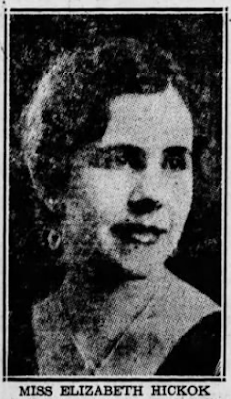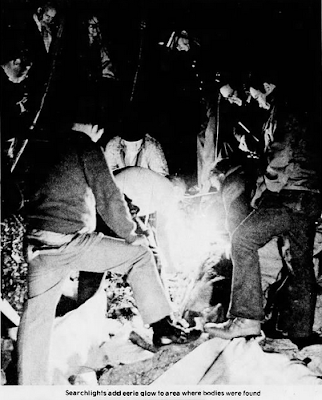The Murder of Betty Hickok
During the early history of Rockview State Penitentiary, the homes of prison officials were tended by "mentally defective" inmates, who served as domestic servants performing a variety of tasks, from cooking and laundry to gardening. Because only the most deserving inmates were rewarded with this respite
from the drudgery of incarceration, the practice endured for many years
without incident. However, things changed in January of 1932, when the
23-year-old daughter of the prison psychiatrist was fatally stabbed by
Fred Collins, described as a 37-year-old "mentally deficient negro
convict" from Franklin County.
In 1924, Fred Collins, a native of Shippensburg, was arrested and convicted of second-degree manslaughter in Beaver County, where he had gone in search of work. After being denied a job by a storekeeper in Beaver Falls, Collins beat the storekeeper to death with an axe and then robbed him. Judge George Baldwin sentenced Collins to a term of ten to twenty years.
What saved Collins from the electric chair at the time was his claim that he had been under the influence of "evil spirits", which had been troubling him ever since 1909, when he suffered a fractured skull. After his transfer from Western Penitentiary to Rockview, Collins was placed under the care of prison psychologist, Dr. Asa L. Hickok, and remained under the doctor's care for the next four years.
During this time, Collins proved to be a model inmate, and he was rewarded for his exemplary behavior with a job as a cook and a guard at the Hickok home. Before long, Collins had free access to the house, where the doctor lived with his wife and daughter, Betty. While many people would be reluctant to permit a convicted killer inside their home, Dr. Hickok believed that his patient had long since recovered from his hallucinations and mental anguish, and the doctor firmly believed that Collins was harmless. This miscalculation would soon bring tragedy to the Hickok family.
On Monday morning, January 13, 1932, Collins left his cell and walked to the Hickok residence on the prison grounds to begin his workday. Dr. Hickock was in Harrisburg with his wife and son, though Betty, the doctor's daughter, was at home. Collins found the young woman in the Hickok bathroom, raped her, and then hacked off her head with a butcher knife. The act was committed so silently that none of the other servants in the house had heard a thing. After the deed was finished, Collins calmly walked a half mile back to the penitentiary and reported to prison officials what he had done. When asked for the reason for his actions, Collins said that he was jealous over acts of kindness she had performed for other inmates who worked at the Hickok home.
Warden Stanley P. Ashe, who was in Pittsburgh at the time, was notified immediately, and it was decided that Collins would be transferred to Western Penitentiary at once out of concern for the inmate's safety. Once transferred, he would be held in a solitary confinement cell until officials in Centre County completed their investigation.
Later that evening, after a preliminary conference at Rockview, Warden Ashe indicated that first degree murder charged would probably not be brought against Collins-- at least not until a court-appointed sanity commission had gone over every detail of the case. If they found Collins insane, he would be confined to a mental asylum for the remainder of his life.
The following day, an inquest was called by Coroner W.R. Heaton, who declared the murder had been premeditated, and was committed "out of a spirit of revenge and jealousy". Dr. Hickock, quite naturally, was devastated when he received the news of his daughter's death, and he immediately returned to Centre County. He later told reporters that had considered Collins harmless, and was at a loss to account for the ghastly crime. He described Collins as an excellent worker, quiet and polite. On Saturday morning, January 16, funeral services for Betty Hickok were held at the prison chapel. After the service, the young woman's body was taken to Auburn Center, in Susquehanna County, and laid to rest in the Hickok family plot at Jersey Hill Cemetery.
The case against Fred Collins was laid before the grand jury on February 8. It took only thirty minutes for the grand jury to indict Collins on a charge of first degree murder, despite evidence that he had been receiving psychiatric care for years. On February 26, Collins would face a jury again, but if he was found guilty, his fate would be the Rockview Penitentiary death chamber.
The Trial of Fred Collins
During jury selection on February 25, Collins expressed little interest in the proceedings, and was seen to doze off on several occasions as the forty-one prospective jurors were questioned. All the female prospects were rejected by the defense attorney, J.J. Johnson, who believed they would be biased against the defendant. When finally asked to plead to the indictment, Collins shot a nervous glance to Johnson, who replied, "Not guilty."
The following morning, the courthouse at Bellefonte was thronged with thousands of people who braved the knifing winds and bitter chill to catch a glimpse of Fred Collins. By 8:30, over five hundred spectators had packed the courtroom, even though the trial was set to begin at 10 o'clock. Those who were denied passes issued by Judge Fleming lingered outside the building, along with a detail of seven state troopers and nine highway patrolmen and five county detectives who had been tasked with keeping order. Dr. Hickok, still reeling from the loss of his daughter, did not attend the trial.
Although it was reported that Collins' attorneys, J.J. and Philip E. Johnson, would petition the court for a sanity test, the only psychiatrist present at the courthouse when the trial got under way was Dr. Cornelius Wholey, who was slated as a witness for the prosecution. In his opening statement to the court, District Attorney John S. Glove emphatically declared that he would prove that Collins was sane when he murdered Betty Hickok, and that he would seek the death penalty.
Those hundreds of souls shivering outside the courthouse didn't have to wait long for a verdict. District Attorney Glove called several prison officials to testify, and all had declared that they had heard Collins confess to the crime. Then Dr. Wholey took the stand. He testified he had examined Collins on multiple occasions and believed the defendant to be sane at the time he murdered Betty Hickok. In what can only be called a shameful display of criminal defense (even the most despicable criminal is entitled to a competent and vigorous defense) the only witness called to testify on behalf of the defense was Fred Collins himself, who tried, in vain, to convince the jury that it was the "evil spirits" that made him commit the crime. The jury deliberated for just one hour before rendering their guilty verdict.
A Happy Walk to the Chair of Death
The sun had not yet climbed the Nittany Mountain when the prison chaplain, Rev. C.F. Lauer, joined the condemned killer in prayer and made the somber walk to the death chamber on May 16, 1932. Newspapers reported that Collins walked to the chair with a smile on his face, but grew impatient as the guards adjusted the straps and began drumming the side of the chair with his fingers. Collins didn't have any final words, and at 7:07 the current was applied. He was pronounced dead just one minute later, and was buried later that morning in the prison cemetery.
Sources:
New Castle News, Jan. 14, 1932.
Harrisburg Telegraph, Feb. 25, 1932.
Franklin News-Herald, Feb. 26, 1932.
Lancaster New Era, May 16, 1932.




Comments
Post a Comment